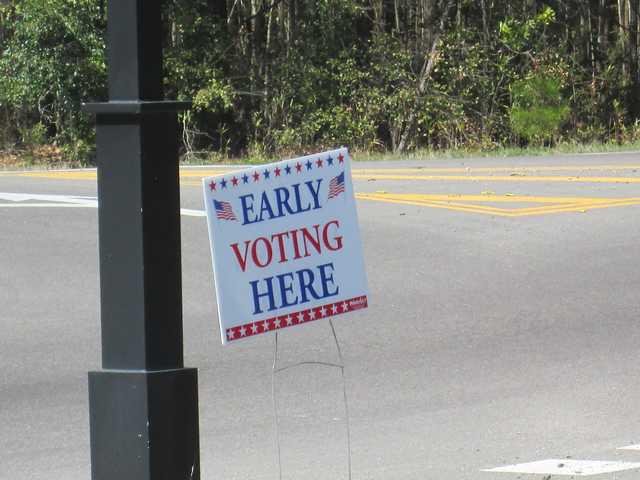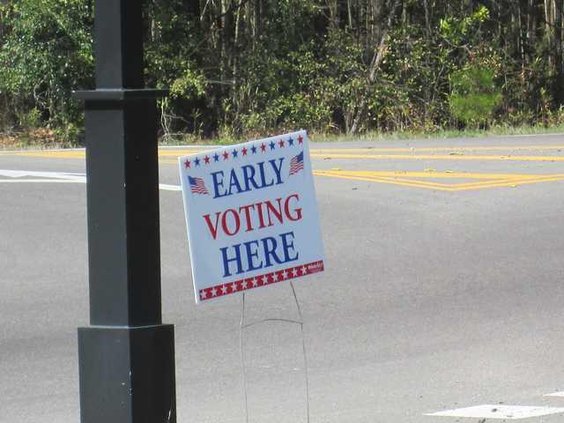As early voting continues in Liberty County at a quick pace, local leaders are encouraging residents to take a long look at one of the ballot proposals — and they’re strongly encouraging voters approve it.
Earlier this year, the General Assembly passed HB 581, which set in motion a constitutional amendment that if approved would set aside a local one-cent sales tax to grant property tax relief.
State Rep. Al Williams D-Midway) brought together a town hall last Wednesday at the Liberty County Performing Arts Center to discuss the bill, along with Liberty County Commission Chairman Donald Lovette, Hinesville Mayor Karl Riles and local attorney Jimmy McDonald, who worked in the Office of the Legislative Counsel. That office crafts the wording for legislation to go before the state House and Senate.
“This money will go to the lowering property tax — nothing else,” Williams said. “Why would anybody vote against their own pocket? If this passes, you’re going to see real tax help.”
McDonald said discussing tax policy is “as dry and boring as it gets.” But, with 20 years of experience working with the General Assembly, McDonald said it was rare to see a piece of legislation with the sole goal “of making our dayto- day lives cheaper.”
“This is one of those ballot questions that is worth talking about,” he said.
As of October 22, more than 9,000 Liberty County residents have cast ballots, with 8,373 using early voting and another 831 using mail-in or drop box for their votes. There are more than 46,695 registered voters in Liberty County, according to the county elections and registration office.
Riles said the city has looked at the proposed amendment and determined it could lower its millage rate by as much 3 mills, if it is passed and put into effect.
“The end game here is to lower property taxes,” he said. “It has to be used as a millage rate reduction.”
If voters statewide approve HR 1022, the ballot measure, then HB 581 goes into effect January 1, 2025. What it will do is establish a floating homestead exemption in areas where it does not exist. Liberty County property owners have the Kemp-Deloach-Williams Act, which limited the growth of property values at 3% or the consumer price index. City of Hinesville property owners do not have the KDW Act at their disposal.
Should the amendment pass, local governments have until March 1, 2025 to opt out of the measure. If they decide to go ahead with it, they can add up another 1% on the sales tax. They can levy from onehalf of a percent to 1%.
The current special local option sales tax in the county is raising about $1.2 million a month, or about $15 million a year. Should the statewide referendum pass, the millage rate would be cut by the amount needed to raise the amount the sales tax generates.
“It doesn’t go for anything else — only to lower your property taxes,” Riles said.
“The only thing it can do is offset your property taxes,” McDonald said. “And not just residential property. If you have any property you are paying ad valorem taxes, the tax bill will show how tax relief you’re getting.”
McDonald also pointed out that if the sales tax for property tax relief goes ahead, it won’t be only Liberty County residents paying to alleviate the property tax for Liberty County landowners.
“Your property tax right now comes out of your pocket,” he said. “There are approximately 100,000 people coming through here every day. When they eat here or shop here, a large percentage is going to be spread out among people who are using our property.”
“This is the first time someone who doesn’t live in my house will have the opportunity to help me pay the property tax on my house,” Riles said. “I think that’s fantastic.”
The idea behind HB 581 came from the success of a similar measure in Macon-Bibb County, which has almost eliminated property taxes there, McDonald added.
On its first vote on the House floor during the last General Assembly session, HB 581 had 175 votes in favor of it and two against it, from the 180 members of the state House. HB 581 was the enabling legislation to put HR 1022 on the ballot.
“We had two nays. It’s tough to get better than all perfect,” Williams said.
Williams said there was lot of bad information being put out against the proposal, including statements that the tax would apply only to residents in a wealthy Atlanta suburb.
“Foolish talk,” he said. Williams also said allegations that the new proposal will take away local valuations of property are false. Some people have reported getting text messages urging them to vote against it.
“It is one thing to get in something. It is another to blatantly lie about it,” he said.
The sales tax, if it is approved, can be re-approved every five years at the local level.
“It’s not open-ended,” McDonald said. “Every five years, they will look at it and ask if it is being used the right way.”
Lovette also dismissed notions that the city builds car washes — those businesses, he said, are franchises, and they see Hinesville as an opportunity for their business. Meanwhile, the cost of paving a road is about $2 million per mile.
“They have checked out the community and decided they can make money,” he said. “But the more we have and the more successful they are, the more revenue we have.”
Once approved, the cities and the county will have to enter into an intergovernmental agreement to put the property tax relief into effect.
Williams, who co-authored the KDW exemption, said that effort failed because it did not cap the millage, though it put a limit on the property values. The amendment on the ballot, he said, “is the single greatest single piece of tax legislation in many, many years.”
“The fire truck is on the way,” Williams said, “and they have water in the tank. We’re going to see real tax reduction. This is a great opportunity to see true tax relief.”
“There are approximately 100,000 people coming through here every day. When they eat here or shop here, a large percentage is going to be spread out among people who are using our property.”

